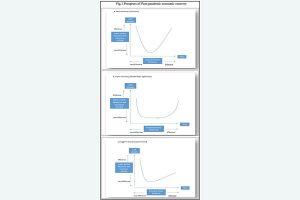Coronavirus economics and Bangladesh
Desperate times call for out-of-the-box policies
Zaidi Sattar from California, USA | Published: April 13, 2020 21:26:39 | Updated: April 13, 2020 21:28:27

First of all, Covid-19 is by far the worst health crisis of our lifetime – described by the World Health Organisation (WHO) as a global pandemic, but one that is moving across borders with a shifting “eye of the storm”. What started off in a heavily industrial region of China (Wuhan, in Hubei province) has now traversed the globe afflicting more than 180 countries at last count. Already, as many as 1.7 million people have been caught up in this pandemic leading to over 100,000 deaths worldwide. In the absence of large-scale availability of testing kits and the promotion of free testing facility in clinics and hospitals around the country it will be some time before we know how widespread the epidemic is in Bangladesh. For starters, given the geometric progression in which this virus is known to spread, it would be fair to presume that the magnitude of Covid-19 cases could be well beyond the official statistics, and growing. Going forward, the public health management strategy would require random testing, statistical analysis and surveillance on a wider scale.
The epicentre of the crisis, having moved from China, to Italy and to Spain, is now firmly berthed in the USA which, as of this writing, crossed 500,000+ Covid-19 cases with over 18,000 deaths and still counting. But “social distancing” and home quarantine, a situation where entire population of a country, region, or city, is ordered to stay-at-home, and all non-essential business or industrial activities stand closed or suspended, seems to be having the desired effect in afflicted communities by slowing down the spread of the novel coronavirus which has proved deadlier and more infectious than any of its previous denominations, e.g. SARS, Avian flu, Ebola. To its credit, Bangladesh Government has taken timely and proactive stance in implementing the internationally endorsed protective measures in order to stem the spread of the virus to its population which lives in one of the world’s most densely populated part of this planet. Staying ahead of the curve has proven to be a far better strategy. However, in a situation so unprecedented as it is, no measure might be enough and slippages are likely. It could be a classic case of learning by doing. No doubt safety and protection of human lives should take the first priority. But it is not the time to choose between public health and the economy. There is no scope for trade-off in the current circumstances. Both deserve attention and proactive management.
NATURE OF THE BEAST: Though lessons are being learnt from the experience of other countries, what is becoming clearer is that we are in uncharted territory when it comes to the economics and healthcare aspects of this pandemic. It is still not clear if this can be called a natural or man-made catastrophe. Historically, there has been other epidemics (e.g. the plague in medieval times, 1918 Spanish flu in Europe) that caused somewhat similar reactions among communities but none led to the kind of disruption to lives and livelihoods so widely across the globe as this one. Perhaps financial and economic globalisation and the inter-connectedness of peoples across the world have a role to play in making this a global pandemic rather than just a regional or national outbreak. Never in history was there such a wholesale suspension of physical movement of people across borders – by land, sea and air. Within borders, country after country is taking the extreme measure of wholesale lockdown and suspension of regular economic and social activities that humanity takes for granted. Consequently, it is not just a healthcare challenge of gigantic proportions, but it has brought on the kind of economic crisis this interconnected world has never seen. Nevertheless, national priorities are clear: the health crisis must be tackled head on to save lives first, then comes the challenge of rebooting the economy. At the end of this episode, it is doubtful if any economy in this globalised world will remain unscathed. That includes Bangladesh.
In this connection, it is useful to recall that despite the significant adverse fallout from the global financial crisis (GFC) of 2008-09 Bangladesh economy came out of the episode without a serious economic shock, something analy







